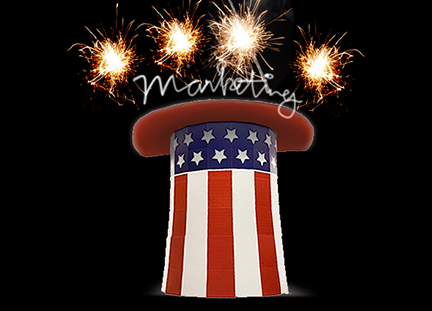 On the eve of the July 4th weekend, let
me ask you a business question. Does patriotism still sell well? Since the
beginning of our nation, brands have tied themselves to flag-waving nationalism
because it creates loyalty with a large group of people. If you attach your
brand to devotion to the country, fervent citizens will show their allegiance
to your brand, so the theory goes.
On the eve of the July 4th weekend, let
me ask you a business question. Does patriotism still sell well? Since the
beginning of our nation, brands have tied themselves to flag-waving nationalism
because it creates loyalty with a large group of people. If you attach your
brand to devotion to the country, fervent citizens will show their allegiance
to your brand, so the theory goes.
Is the American brand still working?
Our nation has lived through periods of time when faith in the flag seemed to
wane. This has always been beaten back by a new surge of patriotic fervor. What
about now? There was a recent study that was released by theWall Street Journalthat suggested
that patriotism was on the decline. This was a follow-up poll that was first
conducted 25 years ago. In 1998, 70 percent of the respondents said patriotism
was very important to them. In 2023, only 38 percent said so. (The recent poll
also saw a decline in several key traditional values, such as the importance of
religion and starting and raising a family.) Is this just a melancholy phase we
are going through or is the dismal outlook on the American way of life here to
stay?
That brings me to the Fourth of July.
There is no holiday that brings our patriotism to the forefront like
Independence Day. Other days are set aside for special remembrance and some of
them have nationalistic appeal. Think about President’s Day, Memorial Day,
Patriot’s Day, Columbus Day or lesser-known and recognized days such as Flag
Day. On these days, we don’t sit in large crowds through long parades or pack
ourselves into viewing areas after dark to watch fireworks displays based on
the National Anthem, but we do on Independence Day. People still give standing
ovations for Lee Greenwood’s rendition of "God Bless the U.S.A.” When you go to
a ballgame, people still rise to their feet to honor America at the playing of
the Star Spangled Banner.
So the anecdotal evidence seems to go
against the research. What should you do if you are in charge of marketing?
Always trust the direction of your target market. How do you accomplish this?
Simply ask them their opinion and listen to them. Isn’t that what the Wall Street Journal poll just did? Many
polls gather the opinions of a cross-section of people who may or may not be
the consumers you are targeting with your brand. Not every group thinks alike;
not every group is your ideal customer. But the other realization you must
understand is that not every poll is unbiased – not by a long shot. There are
political viewpoints pollsters are trying to push – to make a point look bigger
than it really is in the general population. True marketing research is
extremely valuable, but not all polls are marketing research. Unfortunately,
this has cost several well-known brands their reputation with their target
markets lately.They have succumbed to "research” that reported there was
a shift in the way consumers were thinking and when those companies changed
their marketing, they found out they had stepped on the values of their target
market.
American patriotism has a lot of deep
roots. It is one of those concepts that incorporates a lot of values. It is
pro-military, pro-American made, pro-farming, pro-manufacturing, pro-American
sports, pro-family, pro-God, etc. It promotes American exceptionalism, which
can figure out a solution to any problem. It is the first to be generous to
those who have fallen on hard times. When you think about tying your brand to
patriotism, it is hard not to be supportive of all these beliefs and many more.
So does patriotism sell well? It depends on the consumers you are targeting. A
company like Chick-fil-A does very well marketing to patriotic ideals. They are
all about family values, faith and helping people in need. Starbucks does quite
well being edgy and marketing themselves to the left of most, if not all, of
the values I just listed. Why? Because they cater to a target market that would
rather talk about the evils of plastic straws and greenhouse gases than
American jobs or religion. Yet, there is still a line that companies trying to
attract left-leaning consumers must not cross when selling in the American
marketplace. If your brand is seen as anti-American, you will lose credibility,
your brand reputation will be tarnished and you will lose business.
The key in marketing is, and always
will be, to know your target market very well. Whenever we put together a
marketing strategy, I like to talk to the boots on the ground – the people who
are interacting with customers. If they have spent any amount of time at all
with their customers, they know what is valuable to them and what is not. The
good thing about marketing with patriotism is you can position your brand to be
supportive of a lot of these values by simply being pro-American. People will
have good feelings about your brand because you support their beliefs, which
can be found somewhere in all the values that are tangled together to be
patriotic.